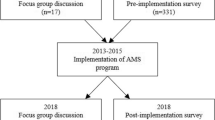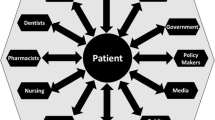Abstract
Purpose of review
Antimicrobial resistance (AMR) is a significant global health issue. Hospital-based antimicrobial stewardship programs (ASPs) are an important component of a “One Health” approach for addressing AMR. However, the adaptation and implementation of ASPs in low-resource settings often faces multiple barriers, which need to be identified and addressed to ensure program effectiveness.
Recent findings
Barriers to ASPs adoption have been identified at the health system and hospital levels, within the organization and interpersonal relationships in wards and departments, and at the individual level of knowledge and perceptions of physicians and other health providers regarding AMR and antimicrobial prescribing practices. Utilizing the Consolidated Framework for Implementation Research (CFIR) is one means of providing a model for adapting ASPs to meet local needs and for recognizing and addressing barriers prior to and during program implementation.
Summary
Despite challenges, hospital-based ASPs have been successfully introduced in low-resource settings. Key components of successful ASPs include a focus on de-escalation, development of local prescribing guidelines, inclusion of non-medical training such as communication, and engagement and partnering with a broad coalition of institutional and organizational stakeholders throughout the adaptation, evaluation, implementation, and scale-up processes.
Similar content being viewed by others
References and Recommended Reading
Papers of particular interest, published recently, have been highlighted as: •• Of major importance
WHO/EMP/IAU. Global Framework for Development and Stewardship to Combat Antimicrobial Resistance: Draft Roadmap. 2017. Available at: http://www.who.int/antimicrobial-resistance/global-action-plan/UpdatedRoadmap-Global-Framework-for-Development-Stewardship-to-combatAMR_2017_11_03.pdf?ua=1 Accessed August 9, 2018.
Basnyat B, Pokharel P, Dixit S, Giri S. Antibiotic use, its resistance in Nepal and recommendations for action: a situation analysis. J Nepal Health Res Counc. 2015;13(30):102–11.
Cosgrove SE, Patel A, Song X, Miller RE, Speck K, Banowitz A, et al. Impact of different methods of feedback to clinicians after post-prescription antimicrobial review based on the Centers for Disease Control and Prevention’s 12 Steps to Prevent Antimicrobial Resistance Among Hospitalized Adults. Infect Control Hosp Epidemiol. 2007;28(6):641–6. https://doi.org/10.1086/518345.
De Waele JJ, Akova M, Antonelli M, Canton R, Carlet J, De Backer D, et al. Antimicrobial resistance and antibiotic stewardship programs in the ICU: insistence and persistence in the fight against resistance. A position statement from ESICM/ESCMID/WAAAR round table of multi-drug resistance. Intensive Care Med. 2018;44(2):189–96. https://doi.org/10.1007/s00134-017-5036-1.
Erin N. O’Leary et al., “Uptake of Antibiotic Stewardship Programs in U.S. Acute Care Hospitals: Findings From the 2015 National Healthcare Safety Network Annual Hospital Survey,” Clin Infect Dis. 2017: https://doi.org/10.1093/cid/cix651.
Friedman DN. Antimicrobial stewardship: the need to cover all bases. Antibiotics. 2013;2(3):400–18. https://doi.org/10.3390/antibiotics2030400.
•• Davey P, Marwick CA, Scott CL, Charani E, McNeil K, Brown E, et al. Interventions to improve antibiotic prescribing practices for hospital inpatients. Cochrane Database of Syst Rev. 2017. Issue 2 Art No.: CD003543. https://doi.org/10.1002/14651858.CD003543.pub4. A comprehensive review of randomized controlled trials and non-randomized studies of hospital-based antibiotic stewardship programs.
The Pew Charitable Trust. Antibiotic Stewardship Programs Vary in U.S. Hospitals. October 2016. Available at: http://www.pewtrusts.org/-/media/assets/2017/09/arp_antibiotic_stewardship_programs_vary_in_us_hospitals.pdf Accessed August 5, 2018.
Charani E, Castro-Sanchez E, Holmes A. The role of behavior change in antimicrobial stewardship. Infect Dis Clin N Am. 2014;28:169–75. https://doi.org/10.1016/j.idc.2014.01.004.
van Limburg M, Sinha B, To-Ten-Foe JR, van Gemert-Pijnen JEWC. Evaluation of early implementations of antibiotic stewardship program initiatives in nine Dutch hospitals. Antimicrob Resist and Infect Control. 2014;3:33–48 http://www.aricjournal.com/content/3/1/33.
Charani E, Holmes AH. Antimicrobial stewardship programmes: the need for wider engagement. BMJ Qual Saf. 2013;22(11):885–7. https://doi.org/10.1136/bmjqs-2013-002444.
Fogarty International Center, National Institutes of Health. Frequently Asked Questions About Implementation Science. May 2013. Available at: http://www.fic.nih.gov/News/Events/implementation-science/Pages/faqs.aspx. Accessed September 22, 2014.
Spoth R, Rohrbach LA, Greenberg M, Leaf P, Brown CH, Fagan A, et al. Addressing core challenges for the next generation of type 2 translation research and systems: the translation science to population impact (TSci Impact) framework. Prevention Science. 2013;14(4):319–51. https://doi.org/10.1007/s11121-012-0362-6.
Sturke R, Harmston C, Simonds RJ, Mofenson LM, Siberry GK, Watts HD, et al. A multi-disciplinary approach to implementation science; The NIH-PEPFAR PMTCT implementation science alliance. JAIDS. 2014;67:S163–7. https://doi.org/10.1097/QAI.0000000000000323.
Damschroder L, Aron DC, Keith RD, Kirsh SR, Alexander JA, Lowery JC. 2009 Fostering implementation of health services research findings into practice: a consolidated framework for advancing implementation science. Implemen Sci. 2009;4:50–65. https://doi.org/10.1186/1748-5908-4-5.
Bal AM, Gould IM. Antibiotic stewardship: overcoming implementation barriers. Curr Opin Infect Dis. 2011;24(4):357–62. https://doi.org/10.1097/QCO.0b013e3283483262.
Skodvin B, Aase K, Charani E, Holmes A, Smith I. An antimicrobial stewardship program initiative: a qualitative study on prescribing practices among hospital doctors. Antimicrob Resist Infect Control. 2015;4:24–32. https://doi.org/10.1186/s13756-015-0065-4.
Broom A, Gibson AF, Broom J, Kirby E, Yarwood T, Post JJ. Optimizing antibiotic usage in hospitals: a qualitative study of the perspectives of hospital managers. J Hosp Infect. 2016;94(3):230–5. https://doi.org/10.1016/j.jhin.2016.08.021.
Ravi N, Laha A, Hmar L, Chatterjee S, Goswami J, Goel G, et al. Exploring the prescribing behaviours and the mind of antibiotic prescribers is critical for a successful antibiotic stewardship programme: results of a survey from Eastern India. Indian J Med Microbiol. 2017;35(2):299–301. https://doi.org/10.4103/ijmm.IJMM_17_133.
Esfandiari A, Rashidian A, Masoumi Asl H, Rahimi Foroushani A, Salari H, Akbari Sari A. Prevention and control of health care-associated infections in Iran: a qualitative study to explore challenges and barriers. Am J Infect Control. 2016;44(10):1149–53. https://doi.org/10.1016/j.ajic.2016.03.049.
•• Howard P, Pulcini C, Levy Hara G, West RM, Gould IM, Harbarth S, et al. An international cross-sectional survey of antimicrobial stewardship programmes in hospitals. J Antimicrob Chemother. 2015;70(4):1245–55. https://doi.org/10.1093/jac/dku497 A comprehensive survey of antimicrobial stewardship programs in Europe, North America, Africa, South and Central America, Asia, and Oceania.
Sharma M, Damlin A, Pathak A, Stålsby Lundborg C (2015) Antibiotic Prescribing among Pediatric Inpatients with Potential Infections in Two Private Sector Hospitals in Central India. PLoS ONE. 2015;10(11):e0142317. https://doi.org/10.1371/journal.pone.0142317
Rezal RS, Hassali MA, Alrasheedy AA, Saleem F, Yusof FA, Godman B. Physicians’ knowledge, perceptions, and behaviour towards antibiotic prescribing: a systematic review of the literature. Expert Rev Anti Infect Ther. 2015;13(5):665–80. https://doi.org/10.1586/14787210.2015.1025057.
Pitaknetinan K, Tangcharoensathien V, Supachutikul A, Bennett S, Mills A. Profit, payment and pharmaceutical practices: perspectives from hospitals in Bangkok. Health Policy. 1999;46(3):179–94.
Wertheim HF, Chandna A, Vu PD, Phang CV, Nguyen PDT, Lam YM, et al. Providing impetus, tools, and guidance to strengthen national capacity for antimicrobial stewardship in Viet Nam. PLoS Med. 2013;10(5):e1001429 https://www.ncbi.nlm.nih.gov/pmc/articles/PMC3646721/pdf/pmed.1001429.pdf.
Brink AJ, Messina AP, Feldman C, Richards GA, Becker PJ, Goff DA, et al. Antimicrobial stewardship across 47 South African hospitals: an implementation study. Lancet Infect Dis. 2016;16(9):1017–25. https://doi.org/10.1016/S1473-3099(16)30012-3.
Kaljee L, Joshi RD, Shrestha B, Karki K, Plum A, Prentiss T. A Hospital- and community-based study of antimicrobial resistance and stewardship in Kathmandu. Santa Fe: Society for Applied Anthropology; 2017.
Prentiss T, Joshi ND, Rai S, Veve M, Bajracharya D, Plum A, et al. Antibiotic prescribing practices in a hospital in Nepal. Detroit: Global Health Initiative Symposium; 2017.
Broom J, Broom A, Plage S, Adams K, Post JJ. Barriers to uptake of antimicrobial advice in a UK hospital: a qualitative study. J Hosp Infect. 2016;93(4):418–22. https://doi.org/10.1016/j.jhin.2016.03.011.
Cortoos PJ, Schreurs BH, Peetermans WE, De Witte K, Laekeman G. Divergent intentions to use antibiotic guidelines: a theory of planned behavior survey. Med Decis Making. 2012;32(1):145–53. https://doi.org/10.1177/0272989X11406985.
Chaves NJ, Cheng AC, Runnegar N, Kirschner J, Lee T, Buising K. Analysis of knowledge and attitude surveys to identify barriers and enablers of appropriate antimicrobial prescribing in three Australian tertiary hospitals. Intern Med J. 2014;44(6):568–74.
Om C, Vlieghe E, McLaughlin JC, Daily F, McLaws ML. Antibiotic prescribing practices: a national survey of Cambodian physicians. Am J Infect Control. 201644(10):1144–8. https://doi.org/10.1016/j.ajic.2016.03.062.
García C, Llamocca LP, García K, Jiménez A, Samalvides F, Gotuzzo E, et al. Knowledge, attitudes and practice survey about antimicrobial resistance and prescribing among physicians in a hospital setting in Lima. Peru. BMC Clin Pharmacol. 2011;11:18–26 http://www.biomedcentral.com/1472-6904/11/18.
•• Labricciosa FM, Sartelli M, Correia S, Abbo LM, Severo M, Ansaloni L, et al. Emergency surgeons’ perceptions and attitudes toward antibiotic prescribing and resistance: a worldwide cross-sectional survey. World J Emerg Surg. 2018;28:13–27. https://doi.org/10.1186/s13017-018-0190-5. A global review of emergency surgeons’ antibiotic prescribing practices
Quet F, Vlieghe E, Leyer C, Buisson Y, Newton PN. Philaysak, et al. Antibiotic prescription behaviours in Lao People’s Democratic Republic: a knowledge, attitude and practice survey. Bull World Health Organ. 2015;93:219–27. https://doi.org/10.2471/BLT.14.142844.
Sutthiruk N, Considine J, Hutchinson A, Driscoll A, Malathum K, Botti M. Thai clinicians’ attitudes toward antimicrobial stewardship programs. Am J Infect Control. 2018;46(4):425–30. https://doi.org/10.1016/j.ajic.2017.09.022.
Pakyz AL, Moczygemba LR, VanderWielen LM, Edmond MB, Stevens MP, Kuzel AJ. Facilitators and barriers to implementing antimicrobial stewardship strategies: results from a qualitative study. Am J Infect Control. 2014:42(10 Suppl): S257–S263. https://doi.org/10.1016/j.ajic.2014.04.023.
Prentiss T, Weisberg K, Zervos J. Building Capacity in Infection Prevention and Antimicrobial Stewardship in Low- and Middle-Income Countries: the Role of Partnerships Inter-countries. Curr Treat Options Infect Dis. 2018;10(1):7–16.
National Institute of Health. Best Practices for Mixed Methods Research in the Health Sciences. Available at: http://obssr.od.nih.gov/scientific_areas/methodology/mixed_methods_research/section2.aspx Accessed August 9, 2018.
World Health Organization. Antimicrobial resistance: Key facts: Available at: http://www.who.int/news-room/fact-sheets/detail/antibiotic-resistance Accessed August 10, 2018.
Kaljee L, Pach A, Garrett D, Bajracharya D, Karki K, Khan I. Social and economic burden associated with typhoid fever in Kathmandu and surrounding areas: a qualitative study. J Infect Dis. 2017. https://doi.org/10.1093/infdis/jix122.
Planta MB. The role of poverty in antimicrobial resistance. J Am Board Fam Med. 2007;20(6):533–9. https://doi.org/10.3122/jabfm.2007.06.070019.
Tiong JJ, Loo JS, Mai CW. Global Antimicrobial Stewardship: A Closer Look at the Formidable Implementation Challenges. Front Microbiol. 2016;7:1860. https://doi.org/10.3389/fmicb.2016.01860.
Hamilton KW, Fishman NO. Antimicrobial stewardship interventions: thinking inside and outside the box. Infect Dis Clin N Am. 2014;28:301–13. https://doi.org/10.1016/j.idc.2014.01.003.
World Health Organization. Implementation Research for the Control of Infectious Diseases of Poverty. Geneva: World Health Organization; 2011.
Author information
Authors and Affiliations
Corresponding author
Ethics declarations
Conflict of Interest
Linda Kaljee, Tyler Prentiss, and Marcus Zervos declare that they have no conflict of interest.
Human and Animal Rights and Informed Consent
This article does not contain any studies with human or animal subjects performed by any of the authors.
Additional information
Publisher’s Note
Springer Nature remains neutral with regard to jurisdictional claims in published maps and institutional affiliations.
This article is part of the Topical Collection on Infection Prevention and Safety in Low and Middle Income Countries
Rights and permissions
About this article
Cite this article
Kaljee, L.M., Prentiss, T. & Zervos, M. Physician barriers to implementation of hospital-based antimicrobial stewardship programs (ASPs): a global perspective. Curr Treat Options Infect Dis 11, 73–80 (2019). https://doi.org/10.1007/s40506-019-0183-2
Published:
Issue Date:
DOI: https://doi.org/10.1007/s40506-019-0183-2




